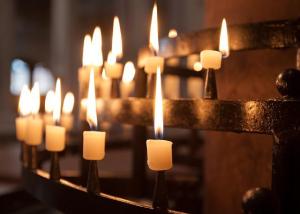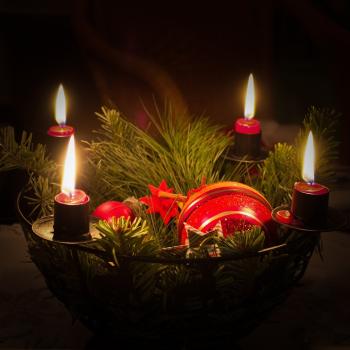
On Sunday, after I went swimming, I went to Mass.
Swimming is where I do some of my best thinking and praying, and what I thought was that I’d like to receive Holy Communion again if I ever could. So instead of giving Michael and Adrienne a ride to Mass, I went with them. I didn’t force myself to go this time. I took stock and realized it had been a low-anxiety week, and maybe my religious trauma would let me get away with it.
I realized my heart still wasn’t racing as I came in the door, so I decided to try sitting on a bench in the back instead of hiding in that foyer.
I thought, for the thousandth time, of the problem of Mother Church– the one I’ve been pondering for a year or more. The one that reached a feverish urgency the past few years. After everything that’s happened, could I really be a daughter of the Catholic Church?
Again, I remembered, Christ never called the Church a mother. In the Gospels, Christ prophesied that the Church would end up being a hireling and a drunk steward; someone who abuses power over the vulnerable people entrusted to him for protection. He prophesies that that drunk steward will get what he deserves in the end, but he doesn’t say how long that will take. There are three times I know of that Christ talks about a mother in the Gospels: he tells John, and therefore the Church, that Mary will be his mother at the crucifixion. He tells the whole crowd, and therefore us, that all who obey him are somehow His mother, sister, and brothers. And He tells Jerusalem that He Himself would like to be their mother, a mother hen keeping them protected and warm, if only they would allow it.
That means that Christ is my mother if I wish. Mary is my mother if I take her into my home. And the people who do God’s will, insofar as they do God’s will, are mothers to the Body of Christ. If they don’t, they’re just drunken stewards beating the Body of Christ until they get their comeuppance. The Church is a mother insofar as she does God’s will. Otherwise, she’s just a stuffy and abusive European bureaucracy with some lovely music and art.
In these past few years of horrible revelations– indeed, in all the seventeen years I’ve lived in the Diocese of Steubenville a mile from Franciscan University– I’ve discovered that the Catholic Church is a flawed, capricious, dangerous mother who does not love me. She doesn’t always give the right answers, but if you question her, you get smacked. This isn’t all right and it can never be all right. I can’t make peace with it. I can’t go back to being the person I was before.
I have prayed that Christ will be a Mother who loves me, even when I feel I can’t believe in a Christ at all.
I have prayed that this dark night of the soul would be the darkness that comes when you open your eyes on a bright sunny day, after being indoors in the dark for too long. I think it has. I see everything so differently in this light: some people seem far worse and so many, many people seem more wonderful than I could imagine. The Church lied to me about them, and about me. She taught me to revere and hate the wrong people. That’s a sin she committed. She is wrong. I’ve learned better.
I think I can be an adult daughter of the Church. I can only ever come to Christ as a little child, but when I came to the Catholic Church as a little child she destroyed me, and then I grew up. So I’m coming to her has a grownup. I’m someone who’s discovered how broken she is, but still sees so much value in her. She is not someone who owns me. She is not someone who has every answer. Occasionally, she gives a very wrong answer, but I admire her when she strives toward the truth. I would like to see if I can be a part of her family, without her hurting me again. I hope that I can.
I am willing to let Christ be my mother, and to be a mother to Christ in that strange way the Gospel teaches, by trying to do God’s will.
These were the things I thought about as I sat in church on the bench with Adrienne and Michael.
It was a pretty liturgy. The organist was out for the day, so it was quiet. I was so glad of that. I love music, but songs I remember can be triggering.
I stimmed with my hands and rocked a little when I felt like panicking.
The homily happened to be about not being afraid– not a terrible take like I’ve heard before, but a sensitive one. I liked it. I am determined to never be afraid again– not that I won’t feel fear. I suffer from OCD and anxiety. I’ll probably feel fear every day of my life. I am sure that my panic attacks will come back and I won’t be able to go to church as regularly as I’d like. I don’t think I can ever go into a confessional again. But I won’t choose fear. I will never again choose to be afraid of witches or pagans or queer people. I won’t choose to fear life or death or angels or demons, powers or principalities. I choose not to listen to the voice of panic that tells me it’s only been fifty-nine minutes after eating and I can’t receive Holy Communion, or that I’ve accidentally committed a mortal sin. Christ my mother has not given me a spirit of fear.
After the dismissal, the priest led us in an a capella verse of “Holy God We Praise Thy Name,” and I sang the harmonies I learned in that perfect church choir back in Columbus.
I make no promises about where I will be next year or even next month. But that’s where I am today. Today I am a queer, autistic, traumatized Catholic who discovered that the Catholic Church isn’t what I thought she was, and grew up. Today, that feels right.
And Christ is my mother.
Mary Pezzulo is the author of Meditations on the Way of the Cross, The Sorrows and Joys of Mary, and Stumbling into Grace: How We Meet God in Tiny Works of Mercy













